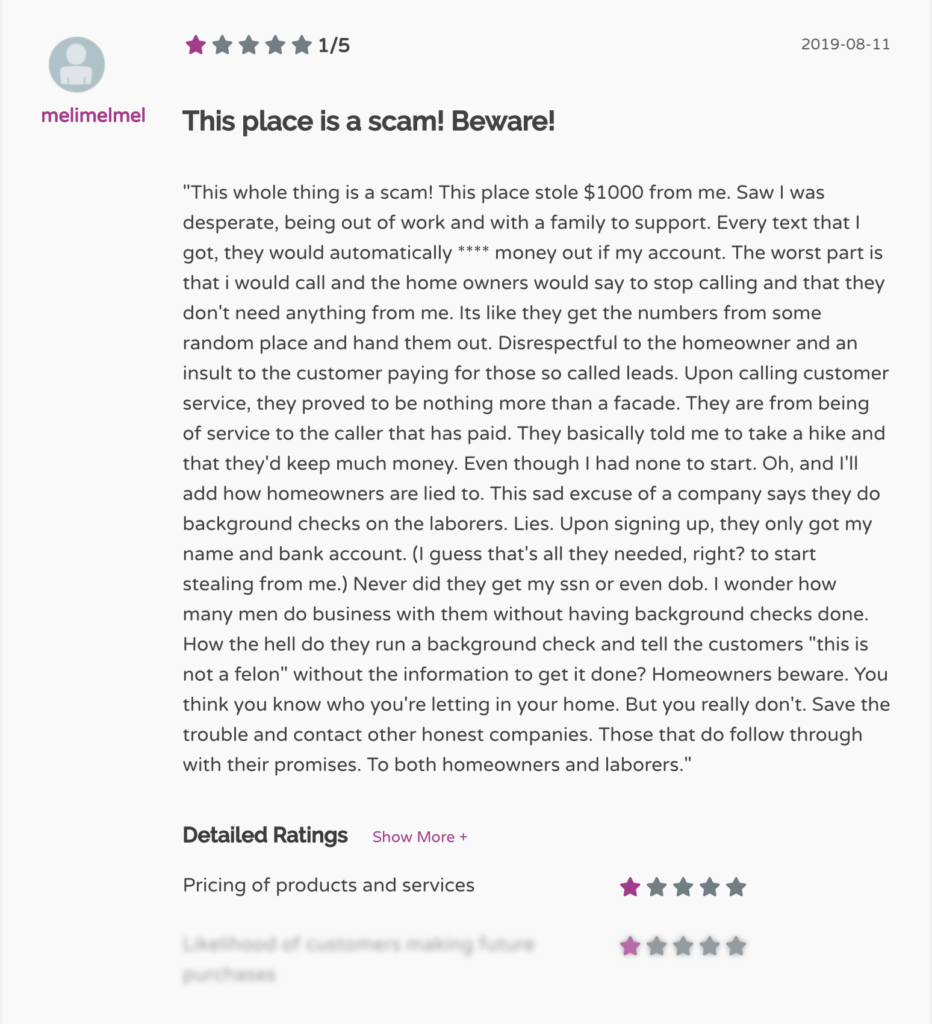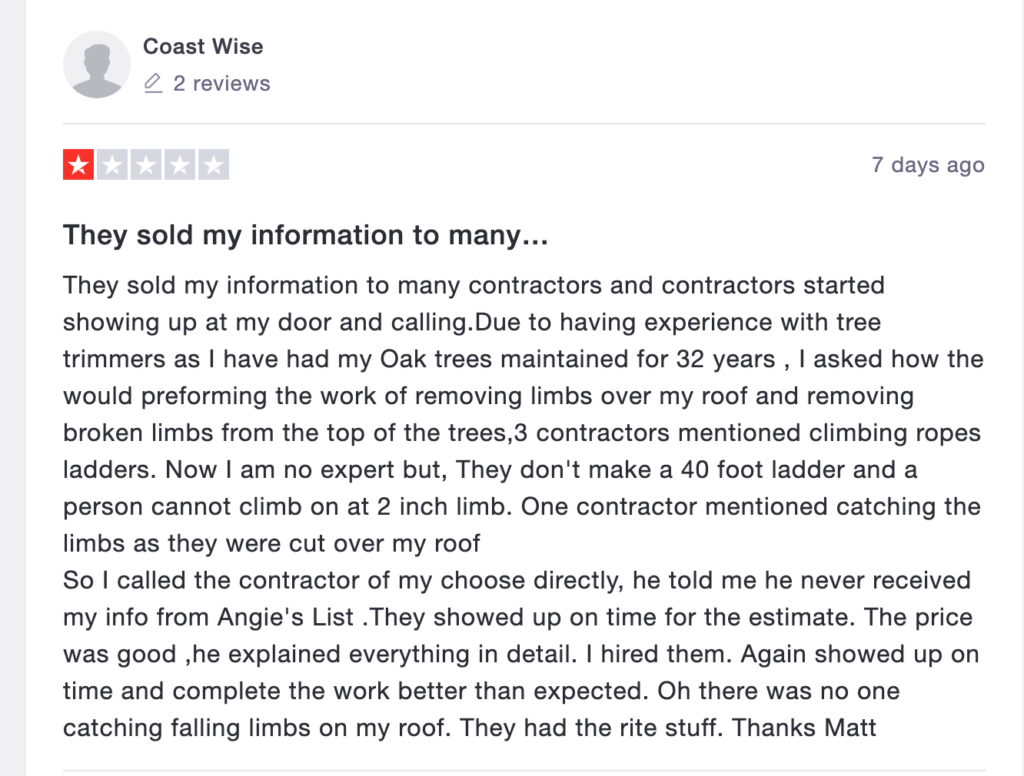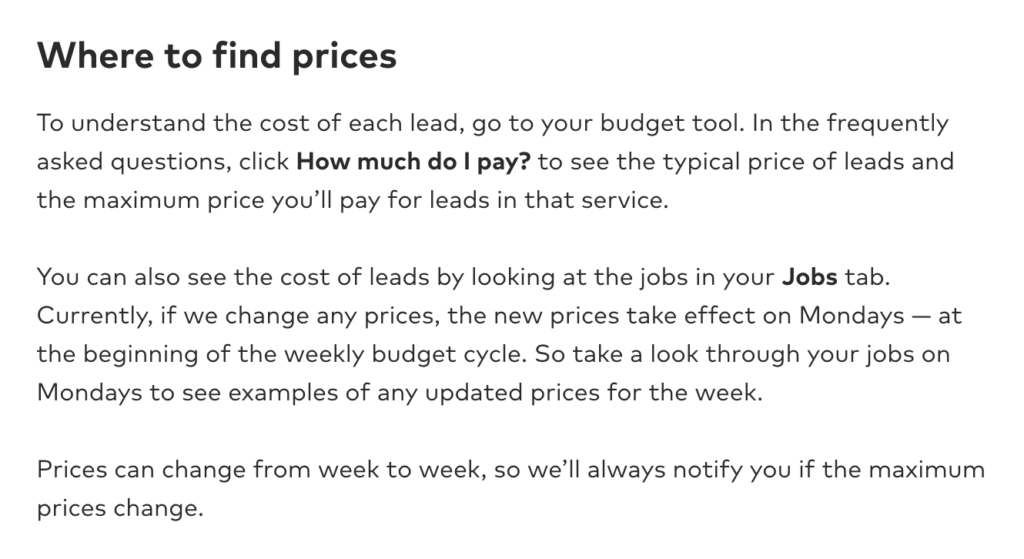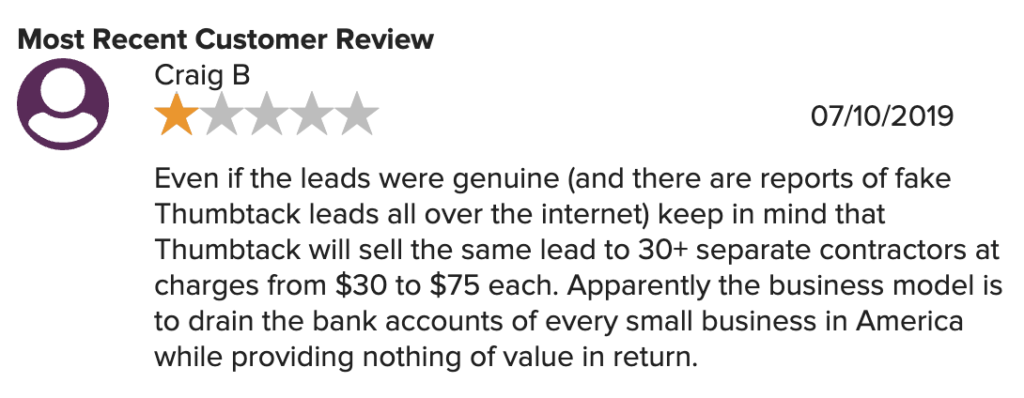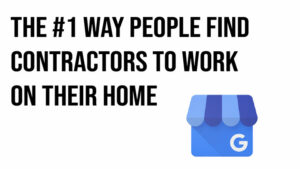You are either a homeowner looking for a good contractor or a contractor looking to be found by good homeowners. This article will guide you through the important details about how these various home improvement marketplaces make it easy to shop contractors.
If you’re a contractor looking for more customers, buying leads should be your last resort. Here’s a link to one of my most recent articles where I go over the major options for contractor lead generation go give you an overview of your options. I recommend checking it out before you get too deep into this long artile.
There is a table of contents below as well as in the sidebar if you are on a computer. This will help you navigate around the article as it is rather large and it’s easy to get lost.
If you have any questions that haven’t been answered please check the comment section below. If you enjoy this article or see a way it can be improved, please leave a comment yourself. Comments are done through Facebook so there’s no login necessary.
You can also watch the video I made on this article if you want to save some time.
Thanks for reading!
Download Step by Step Guide
Find out how to get leads with your Google Business Listing
Table of Contents:
- HomeAdvisor
- Angi (Angie’s List)
- Porch
- Thumbtack
- Bark
- Houzz
- Yelp
- Conclusion for Homeowners
- Conclusion for Contractors
HomeAdvisor Overview | Pros and Cons | Reviews
Formerly known as ServiceMaster, Homeadvisor is the largest player in the world of online home improvement marketplaces. It is owned by IAC, the same company that owns Angi (Angie’s List).
HomeAdvisor offers various ways for homeowners to quickly connect with contractors. Some of their services bypass the need for phone calls to set up the first meeting.
While the service is free for homeowners, contractors must pay on a per-lead basis as well as a yearly membership fee.
HomeAdvisor is popular amongst homeowners, but very unpopular amongst contractors.
Pros for homeowners:
- Contractors are pre-screened for criminal and financial background checks.
- It’s free to sign up.
- It takes some of the due diligence out of having to reach out to multiple contractors and check their referrals.
- Appointments can be scheduled online without the need to directly contact the contractor.
Cons for homeowners:
- Upon signing up, personal information is sold to multiple contractors, often within minutes of completing the form.
- Some homeowners complain about getting too many calls and emails as soon as they submit their information.
- Sometimes matches are made with contractors that aren’t local.
- The pre-screening process can result in a false sense of security for homeowners and lead them to believe they don’t need to run their own screening process. – Fox News Denver, CO.
- Contractor reviews on Homeadvisor are cherry-picked by Homeadvisor per their review guidelines and are not always objective.
Save Some Time and Download the Pros and Cons Cheat Sheet
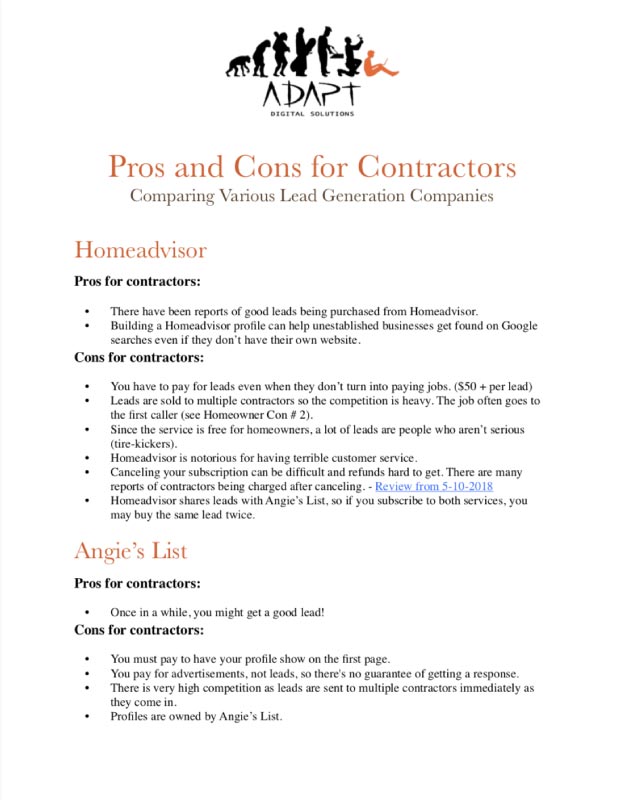
Pros for contractors:
- There have been reports of good leads being purchased from Homeadvisor.
- Building a Homeadvisor profile can help unestablished businesses get found on Google searches even if they don’t have their own website.
- If you are the only professional in your market, you will get more leads.
Cons for contractors:
- Shady Sales tactics. I’ve heard recorded calls where Homeadvisor salespeople will call contractors without stating who they are.
- You have to pay for leads even when they don’t turn into paying jobs. ($50 + per lead)
- Leads are sold to multiple contractors so the competition is heavy. The job often goes to the first caller (see Homeowner Con # 2).
- Since the service is free for homeowners, a lot of leads are people who aren’t serious (tire-kickers). Sometimes even other contractors.
- Homeadvisor is notorious for having terrible customer service. Just do a google search for “Homeadvisor reviews”.
- Canceling your subscription can be difficult and refunds hard to get. There are many reports of contractors being charged after canceling.
- Homeadvisor shares leads with Angi (Angie’s List), so if you subscribe to both services, you may buy the same lead twice.
There’s a class-action lawsuit against Homeadvisor and Angi (Angie’s List). Read about it here.
Conclusion: Should You Use Homeadvisor?
The sentiment on Homeadvisor is split between homeowners and contractors. Homeowners tend to like it because it takes some of the work out of the equation when it comes to hiring a contractor. The main complaint is that sometimes homeowners are contacted by too many contractors at inconvenient times, even when the “no-calls” option is selected. Do you want 20 plumbers calling you?
Contractors tend to dislike Homeadvisor because of the bad customer service they experience, paying for useless leads, and the fact that so many contractors are competing on the same leads at the same time. The consensus is that it’s a waste of money, but as business owners, they have to go where the customers are.
From the outside looking in, it’s apparent that the reason companies like Homeadvisor exist is for the convenience they add on the homeowner’s side. It’s unfortunate that there isn’t as much value offered to the professional side. Overall it seems to have a negative impact on the industry as it promotes contractors handing over their marketing to a company that doesn’t have their best interests in mind. This giant marketing machine then competes with businesses that are trying to market for themselves online, making it more costly and challenging for everyone.
Homeadvisor Reviews by Homeowners: Average Rating: 4/5
- https://www.bbb.org/denver/business-reviews/contractor-referral/homeadvisor-in-lakewood-co-22000608/reviews-and-complaints
- https://www.trustpilot.com/review/www.homeadvisor.com
Homeadvisor Reviews by Contractors: Average Rating: 1.8/5
- https://www.resellerratings.com/store/HomeAdvisor
- https://www.sitejabber.com/reviews/homeadvisor.com
Homeadvisor Reviews by Employees: Average Rating: 3.7/5
Update: I decided to check the review sites and see if anything changed. One thing I noticed is that on Trustpilot, most of the positive reviews are from people that have only left 1 review total. I see this a lot when companies buy reviews. Believe it or not, there are companies in places like India where you can order a ton of reviews and employees will go in and create fake accounts and leave reviews. I’m not saying this is absolutely the case, just making an observation.
From the contractor side, unfortunately, most of the reviews still look like this:
Angi (Formerly: Angie’s List) Overview | Pros and Cons | Reviews
Angi (Angie’s List) is the oldest of the home improvement marketplaces. In October of 2017, it was acquired by IAC, the owner of Homeadvisor it’s then largest competitor. “We are owned by that same parent company but we are two separate companies that operate independently. We are one part of the Angi Home Services Brand portfolio. This is a very important distinction.” – Jessica Blalack, Senior Solutions Consultant at Angi.
Angi started off as a paid-only service which helped improve the integrity of the system as a whole. In late 2016 Angie’s List changed their model to be free to join, but pay to play. What this means is that contractors can have a profile for free and pay to rise to the top of the list on page one.
Angi is an advertisement and directory platform and does not sell leads per se. The fee is monthly whether you receive ten leads or zero leads.
A common complaint by homeowners is that they don’t sign up for anything but they still get called by a bunch of contractors… I got to the bottom of why this happens by talking with Jessica Blalack, a higher-up at Angi. This is what she said:
“Non-members (Homeowners) who visit the Angi (Angie’s List) website and elect NOT to sign up for membership are sent through a service request funnel. Their information, as non-members, is then sent to HomeAdvisor advertisers as a lead. HomeAdvisor companies are calling these homeowners and paying to do so as they are considered leads.” – Jessica Blalack, Senior Solutions Consultant at Angie’s List
This might explain why so many leads from Homeadvisor appear to be fake or unresponsive… They are people that didn’t ask to be contacted.
Pros for homeowners:
- Background checks are performed on contractors.
- It’s free to sign up.
- Some contractors have been using this service for over a decade which provides a long history of reviews, which is the main strength of Angi.
Cons for homeowners:
- Though free to sign up, you must provide your personal information in order to read reviews and contact contractors.
- You may be bombarded with phone calls from service providers as soon as you tell Angi what you’re looking for.
- Even if you don’t decide to purchase the service, your contact information is sold to Contractors via Homeadvisor as a lead. (See quote above)
- The calls have been known to last for days. – Review on Consumer Affairs Website (Can’t link to it for some reason)
- Though “verified”, there are reports on occasional fraudulent reviews.
- You must be at Gold Level membership tier to receive customer service regarding contractors you hire through Angi. – Angi (Angie’s List) Website
Pros for contractors:
- Once in a while, you might get a good lead!
- Being established on Angi over a long time will result in better visibility.
Cons for contractors:
- You must pay to have your profile show on the first page.
- You pay for advertisements, not leads, so there’s no guarantee of getting a response.
- There is very high competition as leads are sent to multiple contractors immediately as they come in so you have to be ready to call as soon as you get the lead. This can be annoying for customers as 10 contractors are calling them at once.
- Profiles are owned by Angi so if you stop paying, you stop playing.
- Customer service is notoriously terrible. (See some reviews from Consumer Affairs)
- Angi shares a lead-pool with Homeadvisor, so if you’re paying for both services you might buy the same lead twice.
Save Some Time and Download the Pros and Cons Cheat Sheet

Conclusion: Should You Use Angi (Formerly Angie’s List)?
My research shows that Angi is on a similar level to Homeadvisor, though less popular amongst homeowners due to the pay to play model and poor customer service. There are a lot more complaints… (See Reviews Here)
Contractors have similar complaints to Homeadvisor, in that they typically pay a lot of money for nothing. When they go to cancel, they find the process to be very difficult. Many reports having charges continue even after they decided to cancel.
Of the online home improvement marketplaces, Angi has the worst reviews.
Angie’s List Reviews by Homeowners: Average Rating: 2.2/5
- https://www.bbb.org/indy/business-reviews/contractor-referral/angie-s-list-llc-in-indianapolis-in-3041007/reviews-and-complaints
- https://www.yelp.com/biz/angies-list-sacramento-2
Angie’s List Reviews by Contractors: Average Rating: 1.4/5
- https://www.consumeraffairs.com/online/angies-list.html
- https://www.sitejabber.com/reviews/angieslist.com
- https://angies-list.pissedconsumer.com/review.html
- This website tracks stats like the average amount of $ lost investing in Angie’s List. Amongst the 177 businesses, the average loss was $3900. Wow!
Angie’s List Reviews by Employees: Average Rating: 2.8/5 (Update 3.4/5)
Thumbtack Overview | Pros and Cons | Reviews
The way Thumbtack operates is similar to Porch in that homeowners post their projects and contractors are able to pick which ones they want to pursue. While they used to use a credits system, they changed their pricing structure to straight cash.
Now, how it works is a contractor can reach out to a homeowner if they want to bid their job. If the homeowner responds, then the contractor is charged based on the value of the job. A criticism of this structure is that the contractor does not know how much they are going to be charged until after the homeowner has responded. Another complaint is that even if the homeowner responds to let them know they are not going to hire them, they still get charged.
It’s not super clear how much they will be charging which doesn’t seem all that great to me. Here’s a screenshot of their policy for pricing.
Pros for homeowners:
- It’s free to use
- You can sometimes find good contractors to complete your project.
- There are a variety of services you can search for besides home improvement.
- The power of choice is in your hands.
Cons for homeowners:
- No background checks. There have been reports of unlicensed contractors and felons being part of the program. Thumbtack will remove the accounts of convicted felons if it’s brought to their attention.
- There have been reports of homeowners being connected with professionals that don’t offer the service they’re looking for.
- Homeowners can inadvertently cost a contractor money just for sending them a message.
Pros for contractors:
- There have been reports of successful connections with homeowners that lead to profitable jobs.
- Thumbtack’s Instant Match feature will automatically send quotes to homeowners for pre-selected job types.
- You can pay a subscription to buy leads automatically at a 20% discount (Not sure if this is a good thing. Would need to test)
Cons for contractors:
- You don’t get to see how much you will pay for a lead until after it’s charged.
- It’s been reported that fees and charges can occur without due reason or explanation.
- Reports of bad customer service.
- There have been reports of paying for messages from fake customers.
- Prices continually rise making the system less profitable, especially after abandoning the credits system.
- You pay for communications, not leads. If a customer replies to tell you they are going with someone else, you still pay for the message.
- You have to pay to boost your ranking, but if you do you will automatically buy all leads that qualify depending on your preferences you set up.
Conclusion: Should You Use Thumbtack?
In researching Thumbtack, I found it to be an interesting business model. Charging professionals for communications rather than leads allows Thumbtack to profit even when no value is being transferred. I wasn’t able to find many positive reviews on Thumbtack from anyone. The positive reviews I could find were written by homeowners for the contractors they hired through the platform, not the platform itself. This is unfortunate for the contractors because Thumbtack is getting credit for their hard work. Those reviews would be incredibly valuable on their Google Maps Listing, for example.
There were a lot of professionals saying the platform used to be great, but has recently changed their model and is no longer profitable for them. There are some very interesting stories scattered amongst the reviews. It’s worth taking a look through the links below.
Thumbtack Reviews by Homeowners: Average Rating: 3.9/5
Thumbtack Reviews by Contractors: Average Rating: 2/5
- https://www.sitejabber.com/reviews/thumbtack.com
- https://www.consumeraffairs.com/homeowners/thumbtack.html
Thumbtack Reviews by Employees: Average Rating: 4.4/5
Update: Just looking at the very first review that pops up from the top link above suggests things haven’t changed since 2018. Here’s a screenshot:
Bark.com Overview | Pros and Cons | Reviews
Bark.com is the new kid on the block. It was launched in 2014 and started as a marketplace for web services, but has since spread into local markets including the home improvement space. The way it works is like the opposite of Thumbtack. Homeowners can list their job for free and Contractors can pick and choose which jobs they want to pursue. When a contractor wants to make contact with a homeowner, they must use credits to send a message and receive the customer’s phone number and email. The cost of a credit at this time is 1.65. The number of credits it takes to get the contact information for a certain project is determined by an algorithm based on the estimated value of the project. The average in my experience is about 20 credits per customer contact info.
Here’s a screenshot from Bark’s website showing an estimation for credit cost per lead. They don’t have construction but I would assume it’s about 2x what web design is based on my experience of job cost having worked both industries extensively.
Pros for homeowners:
- There is a multitude of services you can find on bark, not just home improvement services.
- It’s free to use for homeowners
- Bark contacts service providers that aren’t even in the network yet, so you get access to a larger pool of professionals
- The app is very easy to use
Cons for homeowners:
- You don’t get to choose what professionals contact you.
- No background checks
- Might not be ideal for larger, more expensive projects because of the reasons listed above
Pros for contractors:
- You don’t have to create a profile
- You can choose what jobs you pursue
- They offer a money-back guarantee if you spend all your credits and don’t get any jobs from it (Update: they will return your credits if you don’t get any jobs, but only one time.)
Cons for contractors:
- There seem to be a lot of bad leads. People that don’t respond or are not serious about their project or people trying to sell you services. Some just don’t respond. – Ripoff Report
- There have been numerous reports of terrible customer service.
- Leads can be expensive with no guarantee of it paying off. It’s like gambling with your time and money.
- You are competing with a lot of other professionals for each lead.
Here’s a case study I found from a Wedding Photographer trying out Bark. It doesn’t seem like it worked for him at all.
Conclusion: Should You Use Bark?
Now that Bark has been out for a few years it appears to be on par every other online professional marketplace. It’s really easy and free to use for consumers which makes it very popular, especially for smaller projects. The real specialty of Bark is finding services such as a DJ for a wedding. It’s not really geared towards home improvement professionals so it seems to attract the smaller, more handyman-type projects.
Like the rest of the services in this article, I don’t think it’s a great primary lead generation strategy for a construction company. If you have some kind of niche offerings like a wedding DJ or something, it’s probably better suited for that. If you are a homeowner with some small projects you need help with around the house, or if you need your dog walked, Bark might be the perfect option. For contractors, there are better places to invest your time and money if you’re looking for large, serious projects. If you’re a handyman who just wants to make some money to buy beer this weekend, Bark might work just fine. Check out the reviews below to see what people are saying about this online marketplace.
Update 4/2020
I was contacted by the marketing director at Bark over in the UK. He asked if I would be interested in trying their service and updating my review of them. I figured it was worth a shot. You never know what’s going to happen with marketing until you try.
He explained that they are very popular in the UK but not so much in the US, but they would like to change that. I signed up with my remodeling company and let it ride. Over the course of 3 months, I only received 1 lead and they did not respond when I reached out. I got the notification late on a Saturday night, so it wasn’t until Monday that I called. Maybe they had already found someone else to handle their project.
From what I can gather, Bark works better for a handyman and other small project-type contractors. It’s not as popular for things like remodeling.
Overall, I didn’t get a ton of leads or make any money from it, but that doesn’t mean it won’t work for you. I was very pleased with my dealings with the salesman and the account representative. They were very honest about what to expect and they also went through the sales process with me to make sure I was set up for success. The reason I am even mentioning this is that the customer service was very good and that’s rare in this industry. Just last week I had Homeadvisor saleswomen call me 8 times. The last time they called, they even lied about being from Homeadvisor despite using the same number as before… Pretty shady.
Bark isn’t shady. So, give it a try if you’ve already set up your Google Maps listing and have it completely optimized. That should always come first so you can ask for happy customers to leave reviews there.
(Update: There are a lot more reviews since first writing this article. The consensus seems to be that homeowners love the service while professionals hate it.)
Bark Reviews:
- https://www.trustpilot.com/review/bark.com
- https://www.sitejabber.com/reviews/bark.com
- https://fitsmallbusiness.com/bark-com-user-reviews-pricing/
Bark Reviews by employees: Average Rating: 4.4/5
Porch Overview | Pros and Cons | Reviews
Porch is a little different than the other home improvement marketplaces. Here, homeowners sign up and post their projects, budgets, and timelines, then contractors can pick and choose which ones they want to pursue.
Contractors pay a subscription-based on their service and service-area. They can see the leads before they buy, which is cool. If they decide to contact the lead then they have to pay to do so.
Porch offers additional features such as an app that offers ideas and photos of home improvement projects similar to Pinterest. This can be helpful in communicating to the contractor what the homeowner is looking for.
Porch has numerous partnerships with companies such as Lowes and the BBB that help it bolster its offering to consumers and improve the quality of the information its site.
Pros for homeowners:
- It’s free to use.
- It’s good for finding professionals to complete smaller jobs that larger contractors might not be interested in.
- Background checks are conducted on service providers in certain areas.
- Contractors can be found on Porch through a local Lowes store.
Cons for homeowners:
- Even with background checks, there is no guarantee that the contractor you’re matched with will perform adequately.
- Some report being overcharged for services.
- Not all areas provide background checks.
Pros for contractors:
- Useful for small contractors who want small, handy-man type jobs that only take a couple hours to complete.
- Can sometimes ask for a refund for bad leads.
- Can pay a premium to be featured in local Lowes stores.
- While Homeadvisor will sell the lead to many contractors, Porch limits this to 4 contractors.
Cons for contractors:
- Though I listed this in the Pros, I still think it’s a con for the leads go to up to 4 different contractors so you will be competing right off the bat.
- Poor customer service.
- Can be difficult to cancel the subscription and stop payments.
- Porch offers the “Porch Guarantee” which is their version of a background check. One of the requirements is a strong online presence which can be a challenge for companies that are just getting started or have always found business offline.
- You are paying to promote Porch’s brand, not yours.
Conclusion: Should You Use Porch?
After conducting my research, I’ve found Porch to be similar to the other home improvement marketplaces. The reviews I read lead me to believe their customer service might be a step above the others.
Porch is a younger company but has secured partnerships with large, established companies. Its partnership with the Better Business Bureau allows its website to display more accurate and verified information on contractors. Their partnership with Lowes expands its advertising capability beyond the internet into Lowes stores.
For homeowners, it might be worth looking into. For contractors, proceed with caution. Check out the reviews and decide for yourself if you think it’s worth a shot. If you do give it a try, pay close attention to how much your paying so you don’t get ripped off.
Overall the reviews are hit or miss. The negative reviews seem to be about Porch while the positive reviews are for the people that do the work. In my opinion, those companies doing the work need these reviews on listings they own so hopefully they are getting those.
Porch Reviews by Homeowners: Average Rating: 4.1/5
- https://www.bbb.org/western-washington/business-reviews/contractor-referral/porch-com-in-seattle-wa-22830560/reviews-and-complaints
- https://www.trustpilot.com/review/porch.com
Porch Reviews by Contractors: Average Rating: 1.7/5
Porch Reviews by Employees: Average Rating: 3.4/5 (Update 3.7/5)
Update: I’ve looked at their reviews over the last couple years and it looks like they are making a serious effort to make things right with those who feel wronged. That’s a good sign that they are at least trying to provide a good customer experience.
Save Some Time and Download the Pros and Cons Cheat Sheet

Houzz Overview | Pros and Cons | Reviews
Houzz is a Facebook-like environment where contractors can create profiles for their businesses and showcase their work and testimonials.
Homeowners can create profiles and browse large catalogs of pictures and products aimed at helping them plan and carry out their remodeling projects. One of the coolest features of Houzz is the ability to create idea boards similar to Pinterest. When homeowners and contractors work together on the idea boards it can be a great way to generate plans for a project, especially a home renovation.
The platform is free, but contractors can also pay to advertise, which will push them to the top of the list for people in their local area.
Since Houzz makes its money from advertising and selling products, it’s different than the other services which sell leads and communications.
As far as online home improvement marketplaces go, Houzz is in a league of its own. I include it in this list because it’s one of the main ways homeowners are connecting with contractors in 2019.
Save Some Time and Download the Pros and Cons Cheat Sheet

Pros for homeowners:
- There is a large database of information and pictures that can help with remodeling ideas.
- Can buy home products directly from the site.
- Can browse contractor’s profiles for free.
- Contractor profiles offer a lot of valuable information about the business. Most include tons of pictures.
- Idea boards can be created and shared. This provides a creative experience where homeowners and contractors can communicate ideas for the project through pictures and notes.
Cons for homeowners:
- Can be hard to return or exchange items purchased through Houzz.
- It can be hard to leave an honest review of a contractor if it doesn’t meet Houzz’s review guidelines. They like positive reviews. This skews the integrity of the review system.
- The idea board system can be very useful.
Pros for contractors:
- A free profile can be created and built up with pictures and reviews to help advertise your business on Houzz.
- Contractors can pay to advertise and boost their profiles to the top of the list.
Cons for contractors:
- Advertising contracts can require large cancellation fees to end the service and payments.
- There have been numerous reports of terrible customer service.
- Even if a contractor has a great, built-up profile, other contractors can pay to get ahead of them.
- Paying for advertising doesn’t guarantee jobs. Contractors must still put a lot of time and effort into building and keep their profiles consistently updated.
- There have been reports of getting negative reviews from non-existent customers.
- Houzz owns everything on the contractor’s profile, including the pictures posted there.
Conclusion: Should You Use Houzz?
I was surprised to find so much negative sentiment on Houzz. I have used this service successfully as a contractor, though it was very expensive. I ended up canceling it because it wasn’t as profitable as marketing for myself.
I have met some contractors who have built their entire business on Houzz and swear by it. Since the platform doesn’t charge per lead, it’s possible to get a steady flow of leads at a very affordable rate. Performance is determined by the quality of the profile and the competition on the Houzz platform.
The majority of negative reviews for Houzz are left by homeowners who are angry they cannot return or exchange a product they purchased through Houzz, so that doesn’t speak too much to the quality of connections made with contractors.
I grouped these reviews together because there was no clear distinction of who was leaving reviews on any site.
Houzz Reviews: Average Rating: 3.1/5
- https://www.sitejabber.com/reviews/houzz.com
- https://www.bbb.org/losangelessiliconvalley/business-reviews/bulletin-board/houzz-in-palo-alto-ca-263825/reviews-and-complaints
- https://www.trustpilot.com/review/www.houzz.com?languages=en&stars=5
- https://www.bbb.org/us/ca/palo-alto/profile/bulletin-board/houzz-1216-263825/complaints
Houzz Reviews by employees: Average Rating: 3.5/5
Yelp Overview | Pros and Cons | Reviews
I didn’t include Yelp on this list until Jay Dawes out of Chicago called me up to ask me why I didn’t, and I realized he had a point.
Yelp is one of the most popular local service shopping platforms on the internet. It gets over 145 million visitors per month!
It’s got a reputation for attracting negative reviews. I think this comes from the fact that a customer can create a profile for a business without the business owner’s permission. This is typically done when they want to leave a bad review.
It’s free to sign up and create a profile whether you’re a business or a consumer. They offer businesses the ability to advertise similar to Google Adwords and Houzz. If you pay to advertise, they will show your listing on top of the list as well as of profiles of other companies that haven’t paid. They charge you per view, not per click, which is something to be aware of as they still use the term Cost per Click in their pricing.
Yelp is used for businesses in many different industries, including home improvement services. It’s hard to find information online about Yelp pertaining specifically to the home improvement industry, so I had to reach out to my network and ask about experiences people have had in order to get information for this article.
Pros for homeowners:
- Free to use.
- Typically there are a lot of pictures and reviews to browse.
- You contact the contractor directly, so there are fewer opportunities for miscommunications compared to other online marketplaces.
Cons for homeowners:
- Yelp has an algorithm that controls reviews, so your review for your contractor might not show.
- There are many complaints that Yelp gives preference to paying businesses and will skew reviews in their favor.
- No background checks are conducted on contractors.
- There is no customer service to turn to if something goes wrong with your contractor.
Pros for contractors:
- It’s free to create a profile, post pictures, and gather reviews.
- You can pay to advertise in the directory and on competitor profiles.
- There is a large amount of traffic looking for services on Yelp.
- It’s possible to get fake reviews removed by flagging them yourself.
Cons for contractors:
- If you don’t pay, competitors will advertise on your profile.
- Your reviews might be filtered resulting in a lot of client reviews that never get seen or counted in your star rating.
- Some business owners have said that their rating goes down when they cancel their paid advertising. – BBB Review by Andy F. on 5/20/18
- Yelp salespeople are relentless in pursuing your purchase of advertising.
- The self-service advertisement platform allows minimal control over how your money is spent and provides little metrics reporting. Even Yelp salespeople have told me the self-service platform is bad.
- General contractors focusing on larger projects report a lot of cheapskates and tire-kickers coming in from Yelp.
Conclusion: Should You Use Yelp?
Like the rest of the online marketplaces, Yelp is a good place for homeowners to look for local services. They will find tons of reviews and pictures that can help them make a more educated decision on who to hire. As always, it’s important for homeowners to do their own due diligence and research the companies they intend to hire.
Contractors should definitely invest a little time in creating a Yelp listing and throwing some attractive pictures on it. Those focusing on small projects or commercial jobs can get a lot of quality leads through Yelp, even without investing in the advertising platform.
General contractors and those focusing on larger projects report getting contacted by a lot of tire-kickers and customers requesting quotes with minimal information about their project. For these types of contractors, Yelp seems to be less useful and more of a time-waster.
If a contractor has tested Yelp and found it to be profitable, then I think it can be a great tool for lead generation. For most contractors, however, I wouldn’t recommend it as the main channel in which lead generation is pursued; more of just a small piece of a larger puzzle.
My Personal Experience with Yelp Advertising
In 2018 I was offered $300 credit to advertise on Yelp. Since I am into PPC marketing, I was curious about how their system works. I took them up on the offer and set up a profile. I set my budget to $10/day and planned on making my final decision of whether or not to keep this service after 30 days.
30 days went by and I had but a couple clicks. Hardly any of the credit was spent. At this rate, it would take many months to go through the $300 credit, so I let it run. I found the platform to be a little awkward to navigate compared to other PPC platforms. There was very limited information about what was going on and no options in regards to spending other than the daily budget.
After some time had passed, I checked back in. I was shocked to find that the spending had blown past my $300 credit up to around $600. It was a surprise because I hadn’t had any leads come in through Yelp… What also alarmed me was this: In the beginning, I was paying around $7 per click and getting about 4 clicks per month. By the end, I was paying over $20 per click. But, wait, didn’t I set my max daily budget to $10?
As a marketing manager, I would never have been willing to pay this much per click… Especially when I wasn’t getting any results. It wasn’t clear why the price had gone up that high. The amount spent that last month was exactly $300 even though there were fewer clicks than the month before. This makes it seem like the price per click raises to meet the budget, no matter how many clicks there actually are. This isn’t how other PPC platforms work.
I spoke to some people I know at Yelp and they weren’t able to tell me much more than I knew already. They said the self-service platform is controlled by computer algorithms and that they figured the prices rose because of competition. They couldn’t tell me anything factual or concrete. The numbers just didn’t add up to me.
Regardless, I take full responsibility for letting this happen, and I learned some valuable lessons.
The moral of this story is that the Yelp self-service advertising platform is not really self-service. The only option you can change is the daily budget which actually means monthly budget. Yelp’s computers handle the rest. I’m not telling you not to try it and see if it can be profitable for you, just be careful. Pay close attention and check it often to make sure you are spending what you had planned on spending.
For me personally, I would rather use other PPC platforms that give me control and provide me with enough data to understand what is going on. I found it very sneaky that a daily budget actually means a monthly budget. If it means monthly budget, then say it. Transparency is a key ingredient for good customer experience.
I grouped these reviews together because there was no clear distinction of who was leaving reviews on any site.
Yelp Reviews: Average Rating: 3/5
- https://www.sitejabber.com/reviews/yelp.com
- https://www.bbb.org/greater-san-francisco/business-reviews/internet-service/yelp-com-in-san-francisco-ca-193927/reviews-and-complaints
Yelp Reviews by Employees: Average Rating: 3.4/5
Overall Conclusion for Homeowners
In the world of online home improvement marketplaces, homeowners are the customers, so they are treated the best. All of these services provide easy ways for homeowners to find contractors to complete their projects. The unfortunate side of things is that contractors seem to get the short end of the stick. As they are forced to go where their customers go, they often feel taken advantage of by these massive companies.
My recommendation for homeowners is to find their own contractor. Start with Google. In the last few years contractors have become a lot better at marketing for themselves. With tools like Google Maps, homeowners can easily see star ratings and read honest reviews from customers. They can browse contractor websites to find the one they like the best. With tools like Google Maps Messenger, it’s never been easier to reach out to a contractor and request a meeting and referrals.
I think it’s best to reward those contractors who have invested in their own marketing by building websites and advertising on Google. This shows that they are established and committed to their business, and will likely provide a positive experience for their customers.
A decade ago, Companies like Homeadvisor, Angie’s List, Porch, Thumbtack, and Houzz played an important role in connecting homeowners with contractors. As the internet has matured and more and more contractors have created their own online presence, the need for these companies has diminished. The only reason they still exist is that they got so large that they could afford to advertise more than anyone else in this industry. They now create a large barrier between homeowners and contractors and charge millions of dollars to let the two connect. In 2019, there is no need for this.
If you’re a homeowner looking for a contractor, start with Google and go from there. If you see companies on these matchmaker sites, run their name through a Google search. Likely you’ll find a website and a Facebook profile in which you can connect with them for free. Everybody wins this way. The contractor wins because they have managed to attract customers with their own efforts, and homeowners win because the cost savings of not having to pay these large companies are transferred to the price of the projects.
Overall Conclusion for Contractors
The general consensus from the contractors I’ve talked to is that these companies are to be avoided. If you do decide to try them out, proceed with caution. In 2019 it’s very easy to find someone to build you a website and a proper marketing system that YOU OWN. There are tons of ways to generate leads without turning to these crooked companies for help.
Don’t get me wrong. These companies did offer some value once upon a time, but nowadays they have grown too large and are funding their growth by raising their prices. The conclusion I’ve come to is that these companies are rarely profitable for contractors and should never be the first choice when looking to get more jobs.
If I had to pick one, it would be Houzz. I have met a few people that have had a lot of success with Houzz. They post pictures daily and make sure every single customer they get leaves a positive review. They also pay to advertise. These three things put together seem to create a lot of success on this platform. The downside is that Houzz owns everything on your profile. If you’re comfortable with investing in someone else’s business instead of your own, give it a shot.
The promises these companies make sound great to contractors who just want to pay someone to handle their marketing so they can worry about other things. The fact is, it’s not always good to settle on the first option you come across. The best thing a growing company can do is hire a good marketing manager whether it be in-house or outsourced. Dig deep with this manager and flush out your goals and the roadblocks that might keep you from reaching them. Create a plan that fits your company, and roll with it. The most important part: You own the assets.
Take a little time to research the various free options there are for getting your name out there. Start with a Google My Business Profile and get on Google Maps. Get a website that features all of your business information and showcases your successful projects. There’s nothing better you can do besides learning a little bit and taking control of your fundamental marketing. The next best thing is finding a good marketing agency to partner with that can help you build your marketing assets over the long-term.
Wow… This article ended up way bigger than I intended. I hope it was helpful. I want to be clear that it was not my intention to write a negative article about these companies. I think that for some, they are great ways to acquire new business. From what I could gather, most contractors have a very bad experience and are not shy about telling everyone about it.
Please leave a comment below with your thoughts, stories, or any other information you think should be covered in this article. Thank you for reading.
Find out how other construction companies have successfully found leads on their own:


